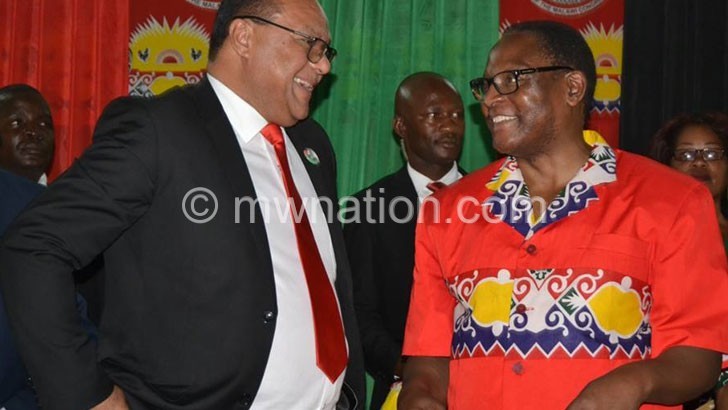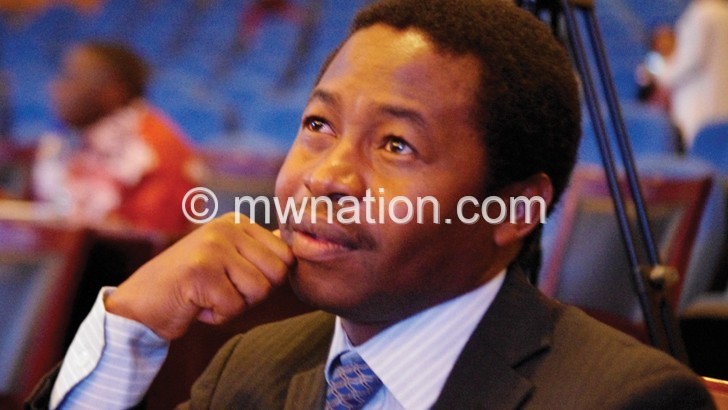Running mate fever rises
During that time, the ministry’s Principal Secretary Francis Chinsinga said the portal was in reaction to Malawians’ demand for transparency in all sectors, including construction.
With just a week before presidential candidates start submitting their nomination forms and formally unveil their running mates, the question of who will make the ticket for perceived election front-runners has gripped the country’s imagination.

Based on The Nation’s monitoring of social media chatter, three things are generating interest. The first is the mystery of who incumbent President Peter Mutharika leading the governing Democratic Progressive Party (DPP) and estranged Vice-President Saulos Chilima of UTM Party will pair with.
The second issue is whether United Democratic Front (UDF) president and Cabinet minister in the Mutharika administration, Atupele Muluzi, as well as former president Joyce Banda—who is also People’s Party (PP) leader—will stand given the former’s working relationship in Parliament the latter’s preference for either an alliance or a coalition of parties to gang up against the party in power.with DPP and considering
Third is if Muluzi and Banda choose not to stand, which horse would they back? Will they sway towards DPP, UTM or Malawi Congress Party (MCP)?

Presidential hopefuls are likely to be using two things in settling for their running mates: Can he or she help them win? Can the ticket partners assist them to govern should they win the elections? These and more are questions that cannot be answered easily.
Perhaps that explains why, from the list of 20 aspirants that Malawi Electoral Commission (MEC) released last week, it is only MCP president Lazarus Chakwera, Tikonze People’s Movement led by former vice-president Cassim Chilumpha and independent hopeful Ras Chikomeni Kadelere Chirwa who have made public their running mates.
Besides Mutharika and Chilima, who paired in the May 20 2014 Tripartite Elections in what was touted as one of the best combinations encompassing public and private sector hands-on experiences, the rest are keeping their choices close to the chest, thereby heightening social media speculation and debate on possible pairings.
Chakwera announced his party’s first vice-president Mohammad Sidik Mia as his running mate on December 2 2018 ostensibly because the MCP membership entrusted Mia to be his deputy at the convention.
Chikomeni, on the other hand, said he is picking his mother Niness Kayengo as his running mate because she has been his adviser all his life while Chilumpha has settled for People’s Progressive Movement (PPM) president Mark Katsonga, a partner in their coalition.
The winning presidential candidate and running mate eventually become the country’s President and Vice-President, respectively. What do presidential candidates look for in running mates? What influence do running mates have on the outcome of elections?
In past elections, analysts we spoke to observed, political parties mostly based their choices for running mates on the level of capacity by certain individuals to mobilise mass ethnic, regional and religious votes, thereby negatively influencing the country’s politics.
Political and governance expert Henry Chingaipe described the choice of particular individuals who can bring votes to the lead candidates as the main element parties consider, especially those that keep identities of their running mates under wraps.
He said: “You will see that people who think that regionalism matters in terms of votes will emphasise on recruiting a running mate who comes from a region help presidential candidates to gain votes and win the government.
He said: “The whole idea of elections has been flawed. Even our choice of President has never been based on criteria where you elect a candidate to deliver a specific agenda because we do not have a national agenda or the basis of looking at the job and finding out who is suitable.”
Mvula opined that the major contributing factor to delays by DPP, UTM, PP and UDF to choose running mates is lack of strong candidates in regions or areas other than those where their leaders originate.





